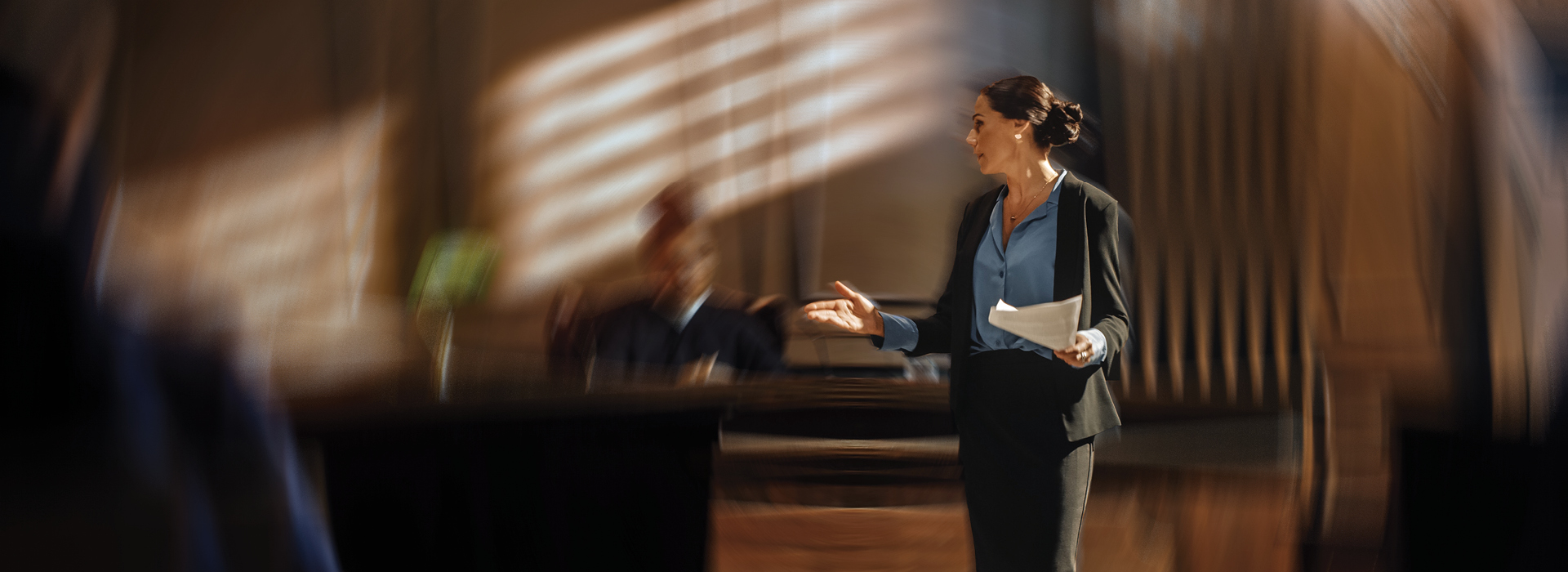What I wish I'd learned in law school

Photo illustrations by Sara Wadford/Shutterstock
Writing well, understanding work politics and knowing how to serve clients as a zealous advocate no matter who tries to stop you are often key abilities for a successful career practicing law. Some say it’s hard to teach law students those skills, but when the knowledge is shared, it’s greatly appreciated.
The ABA Journal asked 25 lawyers what they wish they’d learned as well as the best advice they got in law school and if school had prepared them for practice.
More legal writing instruction and a better understanding of applying caselaw to client representation were mentioned frequently by those lawyers. The group included seasoned attorneys whose legal education often centered on the Socratic method as well as newer ones who attended law school when legal writing and clinics were more common parts of the curriculum.
Not all lessons were learned in the classroom. Some of it came from family, such as a lawyer who pointed out to his grandson that what you hear a client say may not be what he or she means. Or a lawyer’s own realization about the importance of investing in yourself as a young attorney, which may involve time spent on nonbillable tasks.
And sometimes it was about what not to do. Some attorneys interviewed said they remembered the times they didn’t agree with something they were taught in law school, and when it came time to practice, they actually did the opposite—especially if it would benefit their clients.
1. A large majority of state court civil cases are debt collections, eviction and family law matters with a represented party on one side and an unrepresented one on the other and look nothing like cases in law school. I wish I had learned this sooner, because the situation cries out for creative rethinking and as much talent as we can possibly throw at it.
—David Freeman Engstrom, professor, Stanford Law School (Stanford Law School, class of 2002)
2. Judges don’t have the “right” answers all the time or even most of the time. Losing when you should have won is hard. But sometimes you will win when you should have lost.
—Julie Herrera, Law Office of Julie O. Herrera (University of Illinois College of Law, class of 2008)
3. I wish I had learned the more practical aspects of being a lawyer in addition to the Socratic method of thinking. More hands-on training and more background discussions about the real reason for the legal profession: to help people.
—Patricia Brown Holmes, managing partner, Riley Safer Holmes & Cancila and former Cook County associate judge (University of Illinois College of Law, class of 1986)
4. When speaking to the court, that is your time to present your case and advocate for your client. Never let the opposing party or the judge prevent you from arguing an important part or making your case.
—Daniel Kappes, partner, Holland & Knight (Lewis & Clark Law School, class of 2014)
5. The job of the lawyer is not to say no to your client but instead to understand the client’s goals so that you can advise them how to reach them lawfully and ethically.
—Kellye Testy, president and CEO, Law School Admission Council (Indiana University Maurer School of Law, class of 1991)
6. I wish I had learned more about the business of law. I’ve worked in a small boutique, in-house at a Fortune One company and now am a partner at a global firm. They all have one thing in common: Each one is a business enterprise. That wasn’t emphasized enough.
—Joseph West, partner and chief diversity, equity and inclusion officer, Duane Morris, and council chair of the ABA Section of Legal Education and Admissions to the Bar (Tulane University Law School, class of 1986)
7. A cynical professor once advised our class that despite the merits of the case or matter, the side with the “better lawyers” usually wins. The tacit meaning was that BigLaw equated to better lawyers and that Goliath almost always beats David. I took this to heart as a challenge to make sure that my practice supported the Davids of the world whenever possible and to use my training in BigLaw to be a force for right, not just might.
—Seth Bryant, managing partner, Bryant Rabbino (New York University School of Law, class of 1995)
8. The best lawyer isn’t always the person who has memorized the most rules. If a client wants to know the elements of adverse possession in North Carolina, she’ll just Google the question. Lawyers have to provide value above and beyond that—recognizing and explaining uncertainty and guiding clients through it.
—Joseph Blocher, law professor, Duke University School of Law (Yale Law School, class of 2006)
9. My moot court team’s coach was a litigator at a large Chicago law firm. I mentioned once that I was surprised how nice he was because I thought litigators had to be tough and aggressive to win cases. He said litigators know how to be tough, but they also have to know how to be nice because if you’re nasty to opposing counsel, at some point you’ll need something—an extension or a copy of a document you lost—and if you’ve been nasty, they won’t give it to you, and that won’t help your client.
—Lisa Parker Gates, associate vice president and senior associate counsel, Rasmussen University (Loyola University Chicago School of Law, class of 1999)
10. The best advice I discovered is to be your true self. I was afraid that in combination with being Native American and disabled, being a member of the LGBT+ community would work against me and make me unhireable. In reality, it did not matter, and I was able to find a law firm that welcomes me for who I am, and more employers are doing the same all the time.
—Calandra McCool, associate, Big Fire Law and Policy Group (University of Oklahoma College of Law, class of 2019)

11. It is important to view the early years as investment years in which you immerse yourself in learning as much as you can about your substantive practice area—the legal skills you will need to be effective, the cultural norms of your place of employment, etc. And a lot of that will have to be done on your own nonbillable time. You also have to invest in yourself by focusing on your wellness and well-being as well as your resilience and grit.
—Tiffani G. Lee, partner, Holland & Knight (University of Miami School of Law, class of 1997)
12. The importance of reading other people. Figuring out, as my grandfather (a lawyer and former law professor) would say, it’s not just what they said or what you think they meant, but what they actually meant.
—William Elward, senior instructor at Loyola University Chicago School of Law, part-time special prosecutor for the Illinois Office of the State’s Attorney Appellate Prosecutor (Loyola University Chicago School of Law, class of 1993)
13. I wish I’d learned how some of the cases we read had been developed, starting with the litigants’ research; procedural steps through litigation, such as discovery and motions; oral arguments and the appeals process; as well as how nonparties had weighed in, such as through amicus briefs. Being able to see this fuller picture in my subject area would have helped me better appreciate the considerations and nuances involved at each stage of the process, even though I didn’t want to be a litigator.
—Rajesh Reddy, director of the animal law program at Lewis & Clark Law School’s Center for Animal Law Studies (Lewis & Clark Law School, class of 2017)
14. The best piece of advice I got in law school was by way of example. Our bookstore manager, Cindy, treated every student as a person. Those who were aloof to her were people I did not want to associate with. And when other students were stressed out about classes or down because of a poor grade, she offered kindness and friendship. Capital University Law School prepared me to learn, know and argue the law. The school’s brilliance in hiring Cindy taught me how to be a good practitioner and a good person in the business of law.
—Michael D.J. Eisenberg, sole practitioner (Capital University Law School, class of 2002)
15. The best advice I received was to never be intimidated by an opportunity. I was told that if I had an interest in something (e.g., a particular practice area or working on a particular matter), then I should pursue it.
—Daiquiri Steele, professor, University of Alabama School of Law (University of Georgia School of Law, class of 2008)
16. One of my brilliant law school mentors told me that you can always read a book and teach yourself the law you need to practice—law school is so much more than that. The advice was sound: Law school opened the door to amazing possibilities, even if I did not learn the Federal Rules of Criminal Procedure or Federal Rules of Evidence.
—Mary Fan, law professor, University of Washington School of Law (Yale Law School, class of 2003)
17. I wish we had learned more practical skills in law school. It would have been helpful to have more required classes that focus on developing negotiation, writing and researching skills.
—Maybelline Mena-Hadyka, associate, O’Melveny & Myers (New York University School of Law, class of 2017)

18. It’s unfair to say that law school didn’t prepare me, as I would not have been able to practice without it, but there are certainly things that could have gone differently to better prepare me for the realities of practice. Particularly, the focus on BigLaw and the mechanics of BigLaw practice did not prepare me for taking on leadership roles and practice responsibilities early in my career while working at a small firm.
—Renee Nicole Allen, professor of legal writing and director, Center for Race and Law, St. John’s University School of Law (University of Florida Levin College of Law, class of 2009)
19. I would have benefited from a course on jurisprudence that analyzed the reasoning between “right” and “wrong” judicial decisions and competing concepts of “justice.”
—Mark Tuft, partner, Womble Bond Dickinson (University of California College of the Law at San Francisco, class of 1968)
20. I wish that I had learned about the importance of networking and developing relationships through bar association activity and participation in community and other organizations. As my career has progressed, I have realized that such activities enhance your contacts, visibility and profile, which in turn improves your ability to develop business.
—Roberta “Bobbi” Liebenberg, member, Fine, Kaplan and Black (The Catholic University of America Columbus School of Law, class of 1975)
21. Your first job is not your last. View your career in stages, and be open to new opportunities as your goals evolve. If your first step isn’t working, move on.
—Michael R. Dreeben, partner, O’Melveny & Myers (Duke University School of Law, class of 1981)
22. You do not have to practice law to benefit from the education. I remember being told in school that a very high percentage of lawyers are nonpracticing attorneys, and I think it planted the idea that I should consider other business opportunities outside of the law.
—Russell Fergusson, Law Office of Russell Fergusson (North Carolina Central University School of Law, class of 2008)
23. In my three years in law school, the only class that prepared me to be a lawyer was a family law clinic at a legal aid office. You interviewed clients, prepared pleadings and proved up the divorce in front of a judge. It was the very first time that I understood the importance of the Texas Rules of Civil Procedure. Until that time, they were just for memorization for an exam.
—Betty Torres, executive director, Texas Access to Justice Foundation (University of Texas at Austin School of Law, class of 1985)
24. I would have benefited from additional instruction related to some of the “unwritten rules” one needs to know to succeed in a large law firm. For example, it is important to know that law firms are in some ways political and social creatures, so keeping your head down and just working extremely hard at your desk is insufficient if you wish to advance through the ranks and become counsel or partner at a firm.
—Sheila S. Boston, partner, Arnold & Porter (Columbia Law School, class of 1993)
25. Having entered law school with a science degree, I wish I had known more about the history and development of law and legal systems. It took me a bit longer than it should to go from seeing law as a set of rules to a living and evolving ecosystem. As the first lawyer in my family, I also could have known a lot more about the actual practice of law and the differences between various practices. I tried to read up on my own, but a 1L elective on one or both of these topics could surely benefit many.
—Graham Pechenik, founder, Calyx Law (New York University School of Law, class of 2005)
This story was originally published in the April-May 2023 issue of the ABA Journal under the headline: “Reading, Writing and Regret: What I wish I’d learned in law school.”



